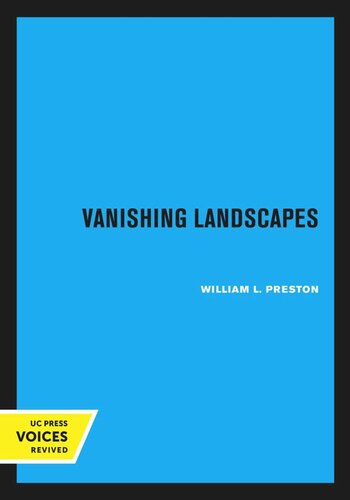

Most ebook files are in PDF format, so you can easily read them using various software such as Foxit Reader or directly on the Google Chrome browser.
Some ebook files are released by publishers in other formats such as .awz, .mobi, .epub, .fb2, etc. You may need to install specific software to read these formats on mobile/PC, such as Calibre.
Please read the tutorial at this link. https://ebooknice.com/page/post?id=faq
We offer FREE conversion to the popular formats you request; however, this may take some time. Therefore, right after payment, please email us, and we will try to provide the service as quickly as possible.
For some exceptional file formats or broken links (if any), please refrain from opening any disputes. Instead, email us first, and we will try to assist within a maximum of 6 hours.
EbookNice Team

Status:
Available4.5
5 reviews
ISBN 10: 0520311256
ISBN 13: 9780520311251
Author: William L Preston
Now no longer well known or clearly recognizable as a region, the Tulare Lake Basin also once supported the densest non-agricultural population in North America. This population, of Yokut Indians, caused little change to the wild oasis environment. Today, however, the Basin bears the rigid imprint of the past two centuries of technological progress, culminating in the complete domination of the land and landscape by large-scale, corporate farming. Natural landmarks and boundaries are subordinate to cultural creations, and the identity of the region has waned with its assimilation into the uniform landscape of international agribusiness and with the gradual demise of the lake itself. After describing the geological processes that created the lake and basin, William Preston considers the values, attitudes to the environment, and aims and technologies that have characterized successive stages of human habitation, leaving their mark upon the land. Using innovative research techniques, and with insight derived from extensive personal knowledge of Tulare and its environs, he reconstructs the physical and cultural realities of each technological period: the Yokut subsistence culture and its disruption by Spanish, Mexican, and American settlers; early sheepherding, cattle ranching, and agricultural experimentation; the arrival of the railroad and of bonanza wheat farming in the late nineteenth century; the small farms stil lin existence during his own youth in Tulare; and, finally, the corporate, "world" farms of today. Integrating ecological and historical perspectives, Preston describes the concrete effects of cultural change upon the land and the land's reciprocal impact upon culture. Rather than just the story of this region, we are given the case history of its physical transformation by forces that have shaped all the Central Valley and California's large urban centers as well. This title is part of UC Press's Voices Revived program, which commemorates University of California Press's mission to seek out and cultivate the brightest minds and give them voice, reach, and impact. Drawing on a backlist dating to 1893, Voices Revived makes high-quality, peer-reviewed scholarship accessible once again using print-on-demand technology. This title was originally published in 1981.
1 The Material Foundation
2 The Yokuts: People of the Land
3 Invasion, Devastation, and Environmental Disruption 1770-1843
4 Manifest Destiny: Anglo Appraisal and Occupation 1844-1856
5 The Formative Era, Part I: Establishing The Modern Patterns of Settlement and Land Use 1857-1871
6 The Formative Era, Part II: The Coming of the Railroad Brings Agricultural Intensification 1872-1894
7 The Spread and Refinement of the New Order: The Era of Small Farm Prosperity 1895-1925
8 Rural Upheavals and the Rise of Agribusiness 1926-1945
9 Agribusiness and the Waning Regional Identity 1946 to the Present
10 Retrospect and Prospect
vanishing landscapes
landscape vanishing point
vanishing land
a vanishing
a vanishing point
landscapes by van gogh
Tags: William L Preston, Vanishing, Landscapes